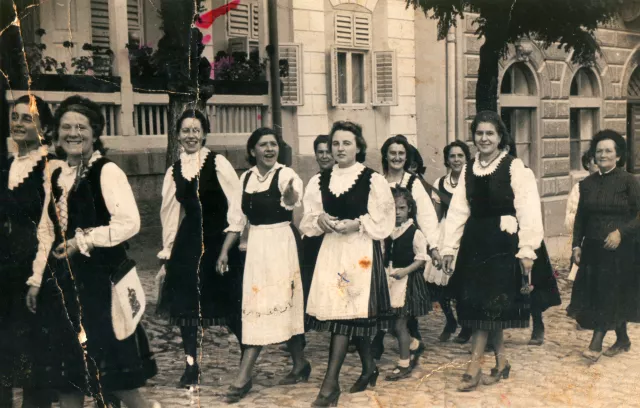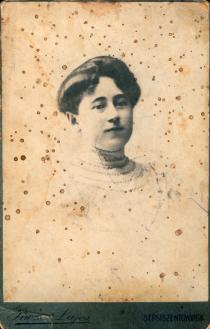I don’t remember on what occassion this photo was taken, but in the middle, the girl in Szekler traditional skirt marked with an X is me, Alice Kosa.
This story of mine doesn't belong to the religious Jewish stories at all.
When I got married, I told my husband that I wouldn't [quit] my religion.
Even if I wasn't observing it, but I wouldn't quit it. I don't believe in that one more, so why should I? At the age of sixteen I was reading Hegel already.
I was already searching for why. So why should I change religion, if I'm doubtful.
But however, I wanted to stick [to my religion], I was born in it, my grandmother lived in this, I didn't want to offend her with things like that.
I told my husband: 'I won't convert to your religion, but if we will have children, they will be reformed.'
I observed my religion in the sense that for example I observed autumn festivals and Christmas [Chanukkah].
I observed autumn festivals due to the fact that my father's sisters lived in Nagyborosnyo.
I had a relative in Feldoboly too, one of my father's first-degree cousins with her family.
Feldoboly is a small village, I think it's three kilometers far from Nagyborosnyo.
For autumn holidays they came [to Nagyborosnyo] to my aunt. The owner of the local distillery had a large apartment, he was Jewish, and he always offered a room for the autumn festivals.
Jews came to Nagyborosnyo from other villages too, from Rety as well, because there was only this room, arranged like a synagogue [prayer house].
They put in benches, chairs. In one part only women, in the other men. I don't know whether it was separated with a curtain, I don't remember.
And the distillery owner was religious, he was from the surroundings of Zilah, he could pray very well, and he knew the religion very well.
And he led the service, and my aunt, aunt Gizella, who adopted my sister, told [me] that I was welcome, if I wanted to celebrate the holiday, I could go if I wanted to.
Well, I didn't convert, I kept my religion, and I went there with Alpar - my son was two years old.
The prayer was recited in Hebrew, and they delivered a speech, and people wished each other all the best.
And we ate good meals at my aunts', because Jews liked to cook tasty things.
At Passover I bought the matzah, my husband and Alpar, my son liked it as well.
But it [Pesach] didn't mean for me what it meant for grandma, who had her own separate [Pesach] dishes, she used those only during those eight days, then she didn't use them during the rest of the year.
Not like this, but I bought the matzah. I even prepared kneydl, which had to be put in the meat soup.
Why shouldn't I prepare it? It's good. And my husband liked it too. But I didn't observe [Pesach] in a religious way, no.
Well, I bought the matzah, I prepared kneydl, but not because it was holiday. T
he next day I would eat a different soup, a pasta soup. This is Passover, that's what I kept [from the tradition], but it's not observing.


















